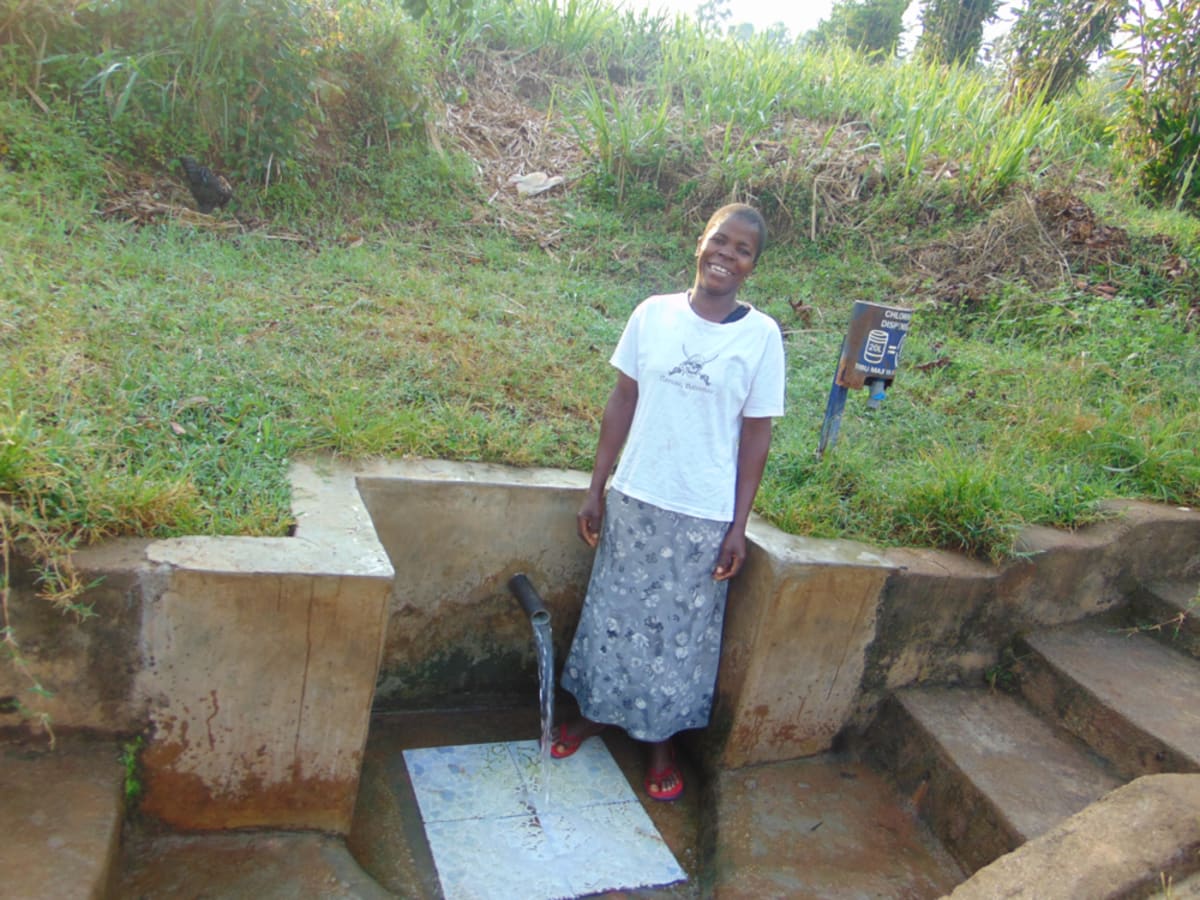May, 2020: COVID-19 Prevention Training Update at Musango Community, Emufutu Spring
Our teams are working on the frontlines of the COVID-19 pandemic. Join us in our fight against the virus while maintaining access to clean, reliable water.

Team Leader Catherine Chepkemoi leads the handwashing demonstration
We are carrying out awareness and prevention trainings on the virus in every community we serve. Very often, our teams are the first (and only) to bring news and information of the virus to rural communities like Musango, Kenya.

Handwashing demonstration
We trained more than 32 people on the symptoms, transmission routes, and prevention of COVID-19. Due to public gathering concerns, we worked with trusted community leaders to gather a select group of community members who would then relay the information learned to the rest of their family and friends.

Handwashing demonstration
We covered essential hygiene lessons:
- Demonstrations on how to build a simple handwashing station
- Proper handwashing technique
- The importance of using soap and clean water for handwashing
- Cleaning and disinfecting commonly touched surfaces including at the water point.

Handwashing demonstration
We covered COVID-19-specific guidance in line with national and international standards:
- Information on the symptoms and transmission routes of COVID-19
- What social distancing is and how to practice it
- How to cough into an elbow
- Alternative ways to greet people without handshakes, fist bumps, etc.
- How to make and properly wear a facemask.

Making a face mask demonstration
During training, we installed a new handwashing station with soap near the community’s water point, along with a sign with reminders of what we covered.

The completed sample face mask made during training
Due to the rampant spread of misinformation about COVID-19, we also dedicated time to a question and answer session to help debunk rumors about the disease and provide extra information where needed.

A man holds the prevention reminder chart at the spring before it is installed on poles
We continue to stay in touch with this community as the pandemic progresses. We want to ensure their water point remains functional and their community stays informed about the virus.

Observing social distancing
Water access, sanitation, and hygiene are at the crux of disease prevention. You can directly support our work on the frontlines of COVID-19 prevention in all of the communities we serve while maintaining their access to safe, clean, and reliable water.

July, 2019: Musango Community, Emufutu Spring Project Complete
Musango Community now has clean water! Emufutu Spring has been transformed into a flowing source of clean water thanks to your donation. The spring is protected from contamination, five sanitation platforms have been provided for the community, and training has been done on sanitation and hygiene.
Spring Protection
"Many have come here and promised us that this spring will be protected, but none of them fulfilled this for us until you came and have made this a reality," said Mrs. Rhoda Omunyifwa.
"This is just amazing, our water is safe now."

The women in this particular area came out in large numbers and contributed to the project by ferrying clean sand that the men harvested from the fast-moving water of the deep Lusumu River. The little ones were not left out. Though they could not do much heavy manual work, they just sat by the site and watched their parents work. The change that was happening seemed to amaze them.

Mealtimes were also amazing as the community members who were helping the skilled artisan would gather by the site and have their meal with them, just like a picnic. The cooperation of this community and their willingness to work alongside us was outstanding and made the work of the artisan and the field officer much easier.

The women could not wait even one day after completion; they began drawing the water immediately. What a relief for this community!
The Process:
Before the construction started, the community members fetched water from the unprotected spring just to ensure that they had enough water for use in their homes.
When the artisan arrived at the site, excavation work was done with great help from the local men. Our artisan was able to direct the spring's water away from the construction site so that it wouldn't interfere. After the excavation had been done, the artisan laid the slab.

All the while, the women were fetching sand from the river bank where it was being harvested. This sand is mixed with water and cement. All the construction days were a beehive of activity as the ones in charge of meals were also running to and fro.
After the foundation slab had been laid, wall work began. When the walls had been put up and plastering done, it was time to do the stairs. Stone pitching is done on either side of the spring to keep dirt from eroding into the access area.

The tiles at the drawing point were fixed and allowed to cure for a whole day. Backfilling from the spring to the discharge pipe was done the following day. Stones of different sizes were used to fill that area, and then it was covered with soil and a thick plastic tarp.

The community was able to construct a fence around the spring immediately after construction, which will keep wild animals and curious children from climbing over where the water flows.
Sanitation Platforms
All five sanitation platforms have been installed. These five families are happy about this milestone of having a private latrine of their own and are optimistic that people will no longer leave waste outdoors. We are continuing to encourage families to finish building walls and roofs over their new latrine floors.

A proud father now has a safe latrine floor for his family to use.
New Knowledge
We worked with a local leader named Mr. Omutekete, who was able to make announcements and contact his community about the importance of our upcoming hygiene and sanitation training. He requested that every household that uses the spring send at least one representative. The attendance was as expected. Many participants availed themselves and some who were helping out to construct a new house near the spring also joined us for the training. Being one of the dry months in Kenya, the weather was hot with the sun shining so bright. We had to sit under the trees at one of the community members' compounds.

At the beginning of the training, some of the attendees were too shy to participate and wouldn't even answer simple questions. But after the facilitator pointed out that these topics can't be learned unless we share our experiences and opinions freely, they felt free and comfortable to air their views and help answer questions.
We covered several topics including leadership and governance; operation and maintenance of the spring; healthcare; family planning; immunizations; the spread of disease and prevention. We also covered water treatment methods, personal care like handwashing, environmental hygiene, hygiene promotion, and many other things.
The community members are now all drying their utensils on dish racks because those who didn't have dish racks saw the importance of having them.

They also immediately adopted the concept of handwashing and everyone wanted to try out the ten steps of handwashing using the leaky tin handwashing station that we built as a demonstration.

The community members were educated on the right way to handle water from the moment it is drawn from the spring to the moment it's stored. This topic was special because the participants were able to go down to the spring and demonstrate how they usually draw and carry water from the spring. They were also able to display the containers they use to fetch water, some being open buckets that they use without lids. Many were shocked to learn that dipping their fingers in the drawn water when the buckets don't have lids can make it dangerous for drinking.
And since we were already down by the spring, the community members were educated on the importance of keeping the spring in good shape by cleaning up the area, repairing when necessary, and not tampering with the protected area. The community members practically ended up training each other on how to sustain their spring. They cautioned each other of the bad practices that would cause their water source to be damaged or even dry up. This was after the facilitator mentioned some of the bad practices - and them knowing each other very well discussed some of these practices further.

Training participants pose for a group picture and hold up the notebooks they used to take notes!
"All along I have always thought that it's teething that has caused my babies to [have] diarrhea - only for me to learn today that it is because of poor hygiene since the babies tend to collect any item and put it in their mouth to ease the itching. If God blesses me with another baby I'll ensure I improve on hygiene, especially on the things the baby puts in the mouth," said Mrs. Makokha.


 Protected Spring
Protected Spring
 Rehabilitation Project
Rehabilitation Project











































